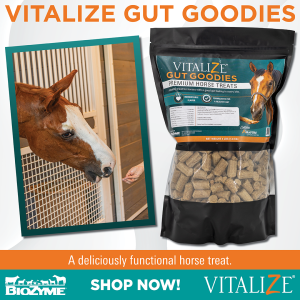
Upset stomach, diarrhea, repeat. If you have a preschool or school-aged child in the winter, these flu-like symptoms seem to rotate through the house. If you are an equine enthusiast, winter diarrhea in horses can easily mimic those of a school-aged child.
Seasonal changes significantly impact winter diarrhea in horses due to a combination of environmental, dietary and management factors. The horse lovers on the Vitalize® team are just like you, we want our horses to stay healthy and perform at their best. That’s why we created this educational resource – to help keep our horses and yours healthy from season to season.
Factors that Impact Winter Diarrhea in Horses
Like those schoolchildren who never seem to stay healthy in the winter, several factors can impact the health and well-being of horses. We have broken these external factors into 6 bite-size chunks for you to digest easily.
1. Cold Weather & Stress
Cold weather can increase stress in horses, particularly if they are not adequately sheltered or accustomed to the climate. Stress can disrupt gut function, leading to winter diarrhea in horses. Additionally, horses tend to drink less water in cold weather, which can lead to mild dehydration and changes in gut motility. If not addressed, this can potentially cause diarrhea or other digestive issues.
2. Dietary Changes
During winter, horses’ diets often shift from fresh pasture to hay. Some horses may struggle to adjust to this change, leading to digestive upset. Learn more about the best hay for horses in winter. Poor-quality hay or forage with mold or dust can irritate the gastrointestinal tract, causing diarrhea.
Hay is not always the culprit. To compensate for energy needs in colder weather, some owners increase grain feeding, which can overwhelm the horse’s digestive system and lead to runny stools. We recommend testing your hay, to ensure you’re getting the most out of your feedstuffs. BioZyme®, the maker of Vitalize, offers free hay testing to its customers. Hay testing is a simple way to learn about the nutritional value of your hay. Once you know the nutrients in your hay, you will understand which supplements or grain to add to your horse’s diet.
3. Parasites
Horses housing encysted small strongyles may experience diarrhea when these parasites emerge from the gut wall, often triggered by seasonal changes or deworming. The absence of proper parasite control during the year can intensify winter diarrhea in horses.
4. Management Practices
Horses housed indoors may face stress from reduced movement and social interaction, both of which can contribute to gastrointestinal distress. Furthermore, improper shelter with exposure to drafts can cause chills, impacting digestion.
5. Bacterial or Viral Infections
Winter weather can increase the spread of infectious agents due to closer housing and reduced ventilation in barns. Diseases like Salmonella or rotavirus can cause diarrhea outbreaks in some herds.
6. Underlying Health Conditions
Horses with pre-existing conditions might be more susceptible to diarrhea during winter due to dietary or environmental stress. Some conditions take special consideration of include hindgut acidosis, leaky gut syndrome and inflammatory bowel disease.
Prevent & Manage Winter Diarrhea in Horses
Although we always encourage proactive measures to prevent challenges from happening, some things in life simply cannot be avoided. When winter diarrhea strikes, be prepared to manage and treat it to the best of your ability.
Maintain Hydration
Provide warm water and encourage drinking by adding electrolytes if necessary. Hydration and appetite work synergistically. If your horse is drinking, it should also have a healthy appetite.
Gradual Dietary Changes
Transition from pasture to hay gradually and ensure hay quality is high. Remember to test your hay.
Monitor Feeding
Avoid sudden increases in grain and ensure a balanced diet.
Deworming
Follow a veterinarian-recommended parasite control program. Horse dewormer not only controls parasites, but it can also help with colic and other challenges.
Shelter
Provide adequate shelter to minimize cold stress. If no inside shelter is available, blanket your horse and provide a windbreak and bedding.
Regular Veterinary Checks
Ensure horses are healthy going into winter and be sure to promptly address any signs of illness. Establish and maintain a good relationship with your veterinarian at all times. A veterinarian-client relationship is vital to ensure your horse is healthy year-round.
Vitalize Can Help
By following the management tips above, you have the best chance of avoiding winter diarrhea in horses. However, seasonal shifts, diet modifications and temperature fluctuations are enough to cause any horse or horse owner stress. When stress arises, digestive upset in the form of diarrhea typically follows.
Additionally, when the body is under stress, the immune system cannot function up to its full potential. By administering Vitalize® Equine Gel during times of stress, your horse’s immune system will get a boost, and its digestive system will stay on track.
Vitalize Equine Gel is a prebiotic and nutrient-rich gel for horses designed to give immediate support to the digestive and immune systems. It contains AO-Biotics® Amaferm®, a prebiotic research-proven to enhance digestibility and MOS (Mannan oligosaccharide) to help normalize hindgut microflora and support the immune system. Vitalize Equine Gel works fast to support appetite and hydration.
Get your Vitalize Today!
Are you ready to purchase Vitalize Equine Gel and put winter diarrhea in horses behind you? You can purchase it online or from one of our authorized online retailers.
Perhaps you like to shop locally. Discover where to buy Vitalize products near you.
Want to learn more about the Vitalize products that can give your horses #agoodgutfeeling? Sign up for our newsletter or visit our Vitalize Product Navigator.

